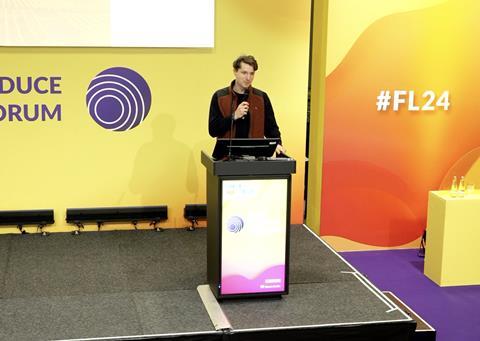This Fresh Produce Forum session looked at the numerous opportunities to adapt and optimise solutions across the business in the face of climate change

Climate change is forcing agriculture to adapt as never before, and this was reflected in a session on the Fresh Produce Forum stage held during the opening day of Fruit Logistica.
Nils Ole Plambeck, team lead arable farming at Agora Agriculture, Christelle Bertin of Blue Whale, and Maximilian Becker, senior vice-president BASF-Nunhems, all took to the stage to offer their views on the challenges created by climate change and potential solutions for the industry.
A threat, and an opportunity?
In his presentation, Plambeck said that climate change was increasingly altering how we live and eat, forcing us to adapt both privately and professionally, something that was a huge challenge.
”However, I think that climate change should not only be perceived as a threat, but it also opens new economic perspectives for those willing to adapt and those who will provide society with the tools that are needed to address the crisis,” he told attendees.
The fresh produce business was a “wonderful example” because of how it geared our dietary patterns towards sustainability, and therefore environmental performance.
Production and demand of fruit and vegetables should, theoretically, grow as a result, and should be at the heart of all cultural and food policy, he said, but that was not always the case.
Plambeck honed in on the Planetary Health Diet, highlighting the impact of food production and consumption, and noted how replacing animal food with plant-based products would make a significant contribution to climate adaptation and mitigation while also freeing up land.
However, growers faced many challenges, he said, and there were no guarantees that increased demand for fresh fruits and vegetables would be met with an increase in production.
Climate change posed many problems, such as increased temperatures, variable precipitation and extreme weather. Droughts would also become more prevalent, with greater regularity and severity, Plambeck warned.
Aside from the weather, increased pest and disease threat, shortage and cost of skilled labour, highly volatile energy prices and societal demand would also add pressure.
“So how do we pave the way forward? How do we promote the sustainable upscaling of fruit and vegetables in Europe?” He asked.
It was important for policy makers to implement reliable planning frameworks to help grow production to meet demand, while producers and retailers themselves should also acknowledge issues such as plant protection and nutrient balance surpluses, and proactively find solutions, Plambeck suggested.
Climate resilience
Climate change resilience in orchards was the central theme of Bertin’s presentation, and importantly, how growers could adapt and move forwards despite the challenges.
”We are experiencing climate-related changes in our orchards now – not in ten years, now,” she told visitors. ”Intense drought, strong winds, flash floods, rainfall variation, late frost and new pests. This is the story in our orchards now.
“So, the question is, how do we continue to provide excellent quality to consumers and the market, less impact, less resources, using fewer phytosanitary products and cutting waste, while still remaining economically viable and profitable?”
Blue Whale has implemented a plan involving five pillars, she explained, considering the needs of growers, clients and consumers.
These pillars are water management, genetics, carbon management, transmission and innovation, or R&D.
Bertin championed Blue Whale’s new ReGeneration project, which is striving to drive sustainability and orchard resilience along with five other partners, while still looking for better taste and nutrition.
“We know that there is not just one solution to climate change, it is more about having a plan, creating solutions and having a clear pathway,” she summarised. ”This way you will have a better opportunity to achieve your objectives.”
Breeding view
The impact of climate change on breeding was the topic addressed by Becker, and meeting the challenges from a BASF-Nunhems viewpoint.
“Climate change for us is a matter of fact, something we all have to deal with,” he said. ”We are exposed to more drastic weather events, fluctuating temperatures, drought, floods and heatwaves, and vegetable production needs to adapt.”
To face up to this challenge, his company was working on a number of solutions, such as breeding sustainable solutions.
This took into consideration varieties that could tolerate climate-related issues such as less water and hotter conditions, without compromising the traits that make the produce appealing to consumers.
Other key solutions included embracing collaboration with other stakeholders, and reducing its carbon footprint.
“We believe in innovation and we believe in collaboration across the value chain,” Becker concluded. ”This is something that is too big a problem to tackle alone, not for one industry, one NGO, for society, it is something for everybody.”



